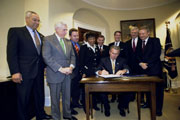
WASHINGTON (BP)–President Bush has signed into law a bill intended to press the Islamic regime of Sudan to end its military campaign against some of its own citizens.
The president signed the Sudan Peace Act Oct. 21. The White House signing ceremony followed by less than two weeks Congress’ passage of a measure that had been deadlocked between the Senate and House of Representatives for a year.
The House and Senate overcame their differences when they adopted a revised version only two days apart. The House approved the bill with a 359-8 vote Oct. 7. The Senate adopted the measure by unanimous consent Oct. 9.
The legislation provides immediate aid to southern Sudan’s beleaguered citizens and requires the White House to monitor peace negotiations and to enforce sanctions on the Khartoum regime if it is not negotiating in good faith or is interfering with humanitarian aid.
The new law “demonstrates the clear resolve of the United States to promote a lasting, just peace; human rights, and freedom from persecution for the people of Sudan,” Bush said in a written statement.
In his statement, however, Bush said he would interpret the law’s requirements to be advisory. If the measure’s directions to the executive branch were considered mandatory, they would interfere with his exercise of foreign relations, the president said.
The Sudanese regime and the resistance forces in the south agreed to a ceasefire beginning Oct. 17 and a resumption of peace talks.
A civil war of a largely religious nature has plagued the African country for nearly two decades. The militant Islamic regime has waged what has been widely described as a genocidal campaign against Christians, animists and moderate Muslims in the southern and central regions of the country.
The Khartoum-supported effort has included slave raids and the bombardment of hospitals, churches, schools and relief stations. It also has consisted of the rape of women and children, as well as the forcible conversion to Islam of children and starvation for Sudanese who refuse to convert. More than 2 million people have been killed and about 4.5 million people have been displaced from their homes.
The U.S. Commission on International Religious Freedom has described Sudan as “the world’s most violent abuser of religious freedom.”
After struggling to work out an agreement on two differing approaches to the problem, House and Senate supporters finally found a compromise several weeks ago.
The House and Senate passed different versions of the Sudan Peace Act in 2001, but only the House measure included language that would have barred companies from being listed on U.S. stock exchanges if they participate in oil development in Sudan. Big business and some in the Bush administration and Senate strongly opposed that element. Profits from oil in Sudan have helped underwrite Khartoum’s military campaign.
The capital markets sanctions were dropped from the legislation that eventually gained passage, but other provisions considered strong ones by supporters were substituted. The final bill includes these elements:
— It requires the president to certify every six months that the Sudanese government and the Sudan People’s Liberation Movement are negotiating properly.
— If he finds the Khartoum regime is not negotiating in good faith or has interfered with aid efforts, the president may choose from the following sanctions — denying to Sudan’s government access to oil revenues; opposing international loans and credit to Khartoum; possibly suspending diplomatic relations with Sudan; and seeking a United Nations Security Council resolution to enact an arms embargo on the Islamic regime.
— It authorizes $300 million in non-military aid to the southern Sudanese during the next three years.
The Southern Baptist Ethics & Religious Liberty Commission is one of many organizations that have worked for adoption of the Sudan Peace Act.
The ERLC helped with a prayer vigil for Sudan two weeks before Congress passed the legislation. The vigil, sponsored by a division of the Institute on Religion and Democracy, was held outside the State Department’s offices in Washington. Speaking on the final day of the weeklong vigil, ERLC President Richard Land called on Southern Baptists and other American Christians to act on behalf of the victims in Sudan in order to be obedient to God.
Bush appointed Land to the U.S. Commission on International Religious Freedom in 2001.
Sudan is one of six countries designated by the State Department in 2001 as countries of particular concern in the area of religious freedom. The others are Burma, China, Iran, Iraq and North Korea.
In addition to the ERLC and IRD, other organizations supporting the Sudan Peace Act included the American Anti-slavery Group, American Jewish Committee, Freedom House’s Center for Religious Freedom, Christian Solidarity International, Religious Action Center of Reform Judaism, Servant’s Heart and World Vision.
–30–
(BP) photo posted in the BP Photo Library at www.bpnews.net. Photo title: SEEKING PEACE IN SUDAN.
















